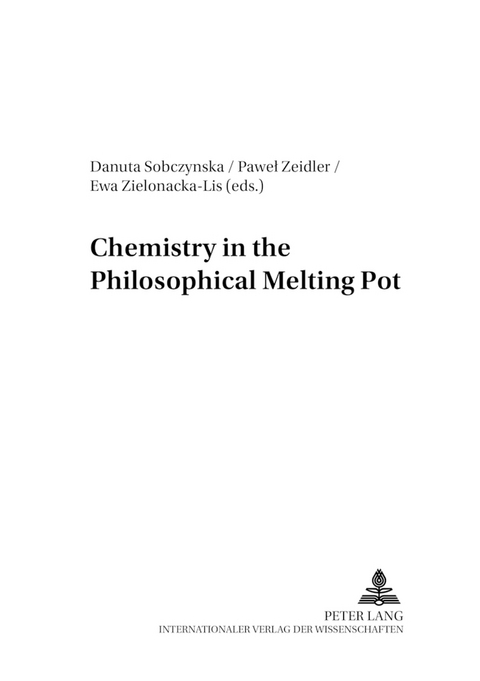
Chemistry in the Philosophical Melting Pot
Peter Lang Gmbh, Internationaler Verlag Der Wissenschaften
978-3-631-52474-9 (ISBN)
The Editors: Danuta Sobczynska, graduated in chemistry, has Ph.D. in philosophy and is a professor at the Institute of Philosophy at the Adam Mickiewicz University in Poznan. Her main research area is the philosophy of science (including the philosophy of chemistry), philosophy of technics and gender studies (especially regarding women in science). Pawel Zeidler, graduated in chemistry, has Ph.D. in philosophy and is a professor at the Institute of Philosophy at the Adam Mickiewicz University in Poznan. His interests concern philosophical and methodological problems of the empirical sciences, especially the realism-antirealism controversy and the philosophy of chemistry. Ewa Zielonacka-Lis, has Ph.D. in chemistry and is a researcher in the Institute of Philosophy at the Adam Mickiewicz University in Poznan. She is at present especially interested in the problem of explanation and description in modern chemistry and in the philosophy of dialogue.
lt;i>Contents: Jaap van Brakel: The Patchworks of Physics and Chemistry: Anomalous Monism and Interdiscourse Relations - Rein Vihalemm: The Problem of the Unity of Science and Chemistry - Hrvoj Vancik: Philosophy of Chemistry and Generalisation of the Concept of Complexity - Johann W. Buchler: Chemistry Seen as Molecular Architecture with a Note on the German Term «Stoff» - Michael Akeroyd: Susan Haack, Fuzzy Logic and the Classification of the Chemical Elements - Claus Jacob: The Use of Philosophy in Chemistry: Logical Aspects of Scientific Arguments in Everyday Research - Roman Mierzecki: The Diffused Meaning of Scientific Terms - Pawel Zeidler: The Semiotic Status of Structural Formulas and the Causal Theory of Reference - Joseph E. Earley, Sr.: On the Relevance of Repetition, Recurrence, and Reiteration - Johannes Hunger: Causal Discovery and the Problem of Automated Generation of Reaction Mechanisms - Slawomir Michalak: The Spark of Thought. On Thermodynamic Aspects of Neurochemical Research - Aldona Krupska: The Role of Autocatalytic Feedback in Chemical and Biochemical Processes - Ko Hojo: Theory, Synthesis, and Aromaticity - Planar or not Planar: [10]Annulene Problem - Ewa Zielonacka-Lis: How Philosophical Models of Explanation Fit Explanations in Modern Chemistry: Concluding Remarks - Valentin Vyazovkin: The Chemical Picture of Nature: Genesis and Evolution - Soledad Esteban: The Evolution of Scientific Ideas: a Way of Learning Chemistry - Vladimir Karpenko: The Chemical Background of Alchemical Recipes - Problems of Analysis - Piotr Warych: Chinese Alchemy. The Roots of Chemistry. Myths and Legends of China - Paul Needham: Generation and Destruction of Chemical Substances: An Exposition of the Aristotelian Conception - Joachim Schummer: Why Do Chemists Perform Experiments? - Danuta Sobczynska: Research Apparatuses and Global Cognitive Changes in Science on the Example of Chemistry - Krystyna Kabzinska: The Atom in Philosophy, Physics and Chemistry by the End of 19th Century. Maria Sklodowska-Curie's Work - the Key to Change in the Notion of Paradigm. Experiments, Intuition and Mind.
| Erscheint lt. Verlag | 11.5.2004 |
|---|---|
| Reihe/Serie | Dia-Logos ; 5 |
| Verlagsort | Berlin |
| Sprache | englisch |
| Maße | 148 x 210 mm |
| Gewicht | 570 g |
| Themenwelt | Geisteswissenschaften ► Philosophie ► Allgemeines / Lexika |
| Geisteswissenschaften ► Philosophie ► Logik | |
| Naturwissenschaften ► Biologie ► Ökologie / Naturschutz | |
| Naturwissenschaften ► Chemie | |
| Schlagworte | Alchemy • Aufsatzsammlung • Chemie • Chemistry • Danuta • Juchacz • Melting • Pawel • Philosophical • Philosophie • piotr • Sobczynska • Zeidler • Zielonacka |
| ISBN-10 | 3-631-52474-9 / 3631524749 |
| ISBN-13 | 978-3-631-52474-9 / 9783631524749 |
| Zustand | Neuware |
| Haben Sie eine Frage zum Produkt? |
aus dem Bereich


